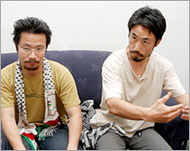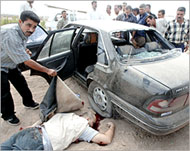Two Japanese journalists killed in Iraq
Two Japanese freelance journalists have been killed in a rocket-propelled grenade attack on their vehicle south of Baghdad.

Hospital director Imad al-Maliki told reporters on Friday the bodies were completely unrecognisable after the attack on Thursday afternoon, but the driver of the vehicle had told him they were the bodies of two Japanese freelance journalists.
Japan’s foreign ministry, which confirmed the attack but said it did not know the fate of the Japanese, said the two involved were Shinsuke Hashida, a well-known 61-year-old freelance journalist, and his nephew, 33-year-old Kotaro Ogawa.
The journalists were returning from Japan’s military base in the southern town of Samawa when they were attacked near the town of Mahmudiya, about 30 km south of Baghdad, a spokesman for Japanese forces in Iraq told reporters.
The journalists were travelling with a driver and translator, but it was not immediately clear what happened to the translator.
Repeated attacks
The area around Mahmudiya is one of the most dangerous spots in Iraq with repeated resistance attacks on US military convoys, foreign contractors and journalists in recent months.
 |
|
Five Japanese civilians were taken |
Three weeks ago a Polish and an Algerian journalist were killed in a drive-by shooting on the same road. A CNN crew was attacked in the same area earlier this year, leaving two dead.
The deaths, if confirmed, would be the third and fourth of Japanese citizens in Iraq since the US-led invasion last year and the first since Prime Minister Junichiro Koizumi sent troops to help rebuild Iraq. Two diplomats were killed in November when their car was attacked near Saddam Hussein’s hometown of Tikrit.
Political fallout?
The latest incident will provoke furious debate in Japan but might not damage Koizumi’s ruling coalition – which faces an election for parliament’s Upper House in July – given that the journalists had travelled to Iraq of their own accord, some political analysts said.
 |
|
Two journalists were killed in |
Japan, a close US ally, has about 550 troops around the southern city of Samawa on a mission designed to help with reconstruction work. It sent the troops on a non-combat mission that is its riskiest military operation since World War Two.
Defence Minister Shigeru Ishiba told a news conference that Thursday’s car attack would not affect operations in Samawa.
An editor at Nikkan Gendai, a tabloid evening newspaper for whom Hashida sometimes worked, told Reuters the paper last heard from him on 23 May, a day before he headed for Iraq.
Hashida had intended to bring back to Japan an Iraqi boy wounded in the eyes by an attack, the editor said.
Five Japanese civilians have been among foreigners taken hostage in Iraq, but were later freed unharmed.
TV crew released
Meanwhile, a four-man team from US television network NBC was released unharmed after being held for more than 48 hours in Falluja, the US-led occupation said.
“There was some good cooperation between the Falluja Brigade and the people of the city who didn’t want to see a repeat of March 31” Major TV Johnson, |
The four, three NBC veterans and an Iraqi, were picked up by a small group of armed Iraqis in the city on Tuesday, according to an NBC statement.
They were released after talks involving locals and the Falluja Brigade, a team of former Iraqi army veterans brought in to control security inside the city, a US occupation military official said.
Major TV Johnson, spokesman for the 1st Marine Expeditionary Force based just outside the city, said: “There was some good cooperation between the Falluja Brigade and the people of the city who didn’t want to see a repeat of March 31”, when four western security contractors were killed in the city, he said.
NBC identified the four as correspondent Ned Colt, cameraman Maurice Roper, soundman Robert Colville and a freelance Iraqi
journalist, Ashraf al-Taie.
They were released “after their identities as working journalists became clear”, said the NBC statement.